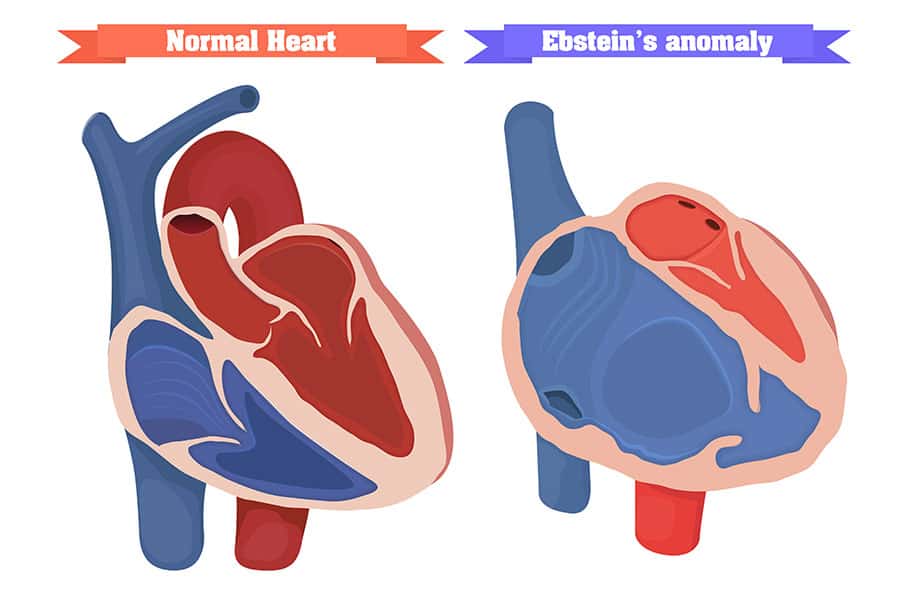Ebstein anomaly is a rare heart defect that’s present at birth (congenital). The condition, primarily affecting the tricuspid valve, can lead to heart failure and arrhythmias. This guide is aimed at elaborating on the intricacies of this condition to enhance understanding and guide those affected.
Definition
Ebstein anomaly is a congenital heart disorder characterized by the malformation and downward displacement of the tricuspid valve into the right ventricle. This displacement disrupts the valve’s function, leading to blood leakage back into the right atrium.
Overview
The human heart consists of four chambers and four valves, which ensure unidirectional blood flow. The tricuspid valve, located between the right atrium and right ventricle, plays a crucial role in this. Anomalies in this valve can cause significant circulatory disruption. Ebstein anomaly, though rare, is a leading congenital defect affecting the tricuspid valve.
Symptoms
While some people remain asymptomatic, common symptoms include:
- Shortness of breath, especially with exertion
- Fatigue
- Heart palpitations or irregular heart rhythms
- Cyanosis (bluish discoloration of the skin)
- Swelling of the legs or abdomen
Causes
The exact cause remains unknown. However, it’s believed that a combination of genetic and environmental factors during fetal development leads to this anomaly.
Risk Factors
Several factors can increase the risk:
- Family History: Those with a family member with a congenital heart defect have an elevated risk.
- Maternal Factors: Drug or alcohol use during pregnancy, maternal viral infection, or the use of certain medications can increase risk.
- Age: Older maternal age at the time of pregnancy can be a potential risk.
Prevention
While it’s impossible to entirely prevent Ebstein anomaly, some steps can reduce risks:
- Healthy Pregnancy: Avoid alcohol, drugs, and exposure to infections. Maintain regular prenatal checkups.
- Genetic Counseling: Especially if there’s a family history of congenital heart defects.
Diagnosis
Diagnosis often occurs during fetal ultrasounds. After birth, it can be identified through:
- Physical Examination
- Chest X-ray
- Electrocardiogram (ECG)
- Echocardiogram
- Cardiac MRI
When to See a Doctor
If your child displays cyanosis, breathlessness, or any unexplained symptoms, seek medical attention. Adults who’ve had a childhood diagnosis should continue regular cardiac check-ups.
Treatment Options
Treatment depends on the severity:
- Mild cases: Often only require regular monitoring.
- Medications: To address heart rhythm abnormalities or heart failure symptoms.
- Surgery: Especially in more severe cases, to repair or replace the tricuspid valve.
- Pacemakers: For those with significant heart rhythm issues.
Living with Ebstein Anomaly
Understanding and adapting are key. Regular medical reviews, maintaining a heart-healthy lifestyle, and joining support groups can aid in managing the condition.
Prognosis
The outcome varies. Many lead normal lives, while some may require multiple surgeries or experience complications. Early diagnosis and timely intervention significantly improve the outlook.
Current Research and Advancements
With advancements in cardiovascular medicine, surgical techniques for Ebstein anomaly are continuously evolving, offering hope for even better outcomes in the future.
Historical Perspective
Ebstein anomaly was first described in 1866 by Wilhelm Ebstein, a German physician. He detailed the post-mortem findings of a 19-year-old man who exhibited signs of the condition. Over the decades, understanding and knowledge about the disease have grown, thanks to advancements in diagnostic technologies and clinical research.
Epidemiology
- Ebstein anomaly accounts for less than 1% of all congenital heart diseases.
- There is no known predilection for any specific gender or ethnicity.
Cellular and Molecular Insights
While the precise molecular mechanisms remain a topic of active research, some studies suggest that mutations in certain genes might contribute to the development of Ebstein anomaly. Genetic counseling and testing can sometimes be beneficial, especially for families with a history of congenital heart conditions.
Associated Conditions
Ebstein anomaly can sometimes be associated with other heart defects, like atrial septal defect or Wolff-Parkinson-White syndrome. This underlines the importance of comprehensive cardiac evaluations in affected individuals.
Potential Complications
While timely treatment can manage the condition, potential complications include:
- Heart failure
- Blood clots, which could lead to strokes or pulmonary embolism
- Sudden cardiac death, especially if associated with arrhythmias
Psychological and Social Implications
Living with a congenital heart defect can lead to various emotional and social challenges. Anxiety, depression, and feelings of isolation can be common. Seeking psychological counseling, joining support groups, or engaging in community outreach can be instrumental in navigating these challenges.
Role of Diet and Lifestyle
A heart-healthy lifestyle is crucial:
- Maintain a balanced diet, rich in whole grains, lean proteins, and fresh vegetables.
- Limit intake of saturated fats, sugars, and sodium.
- Engage in regular, moderate exercise, after consulting with a cardiologist about any limitations.
- Avoid smoking and limit alcohol consumption.
Ongoing Research and Future Prospects
Current research is looking at the genetic markers and potential preventive strategies during pregnancy. With advances in regenerative medicine, there is hope that in the future, treatments may involve tissue engineering or even stem cell therapies to repair or replace the affected valve.
This detailed guide aims to shed light on the complex nature of Ebstein anomaly, guiding patients and their families through the nuances of this condition. Remember, while this condition is challenging, advancements in medicine and a robust support system offer a beacon of hope.









